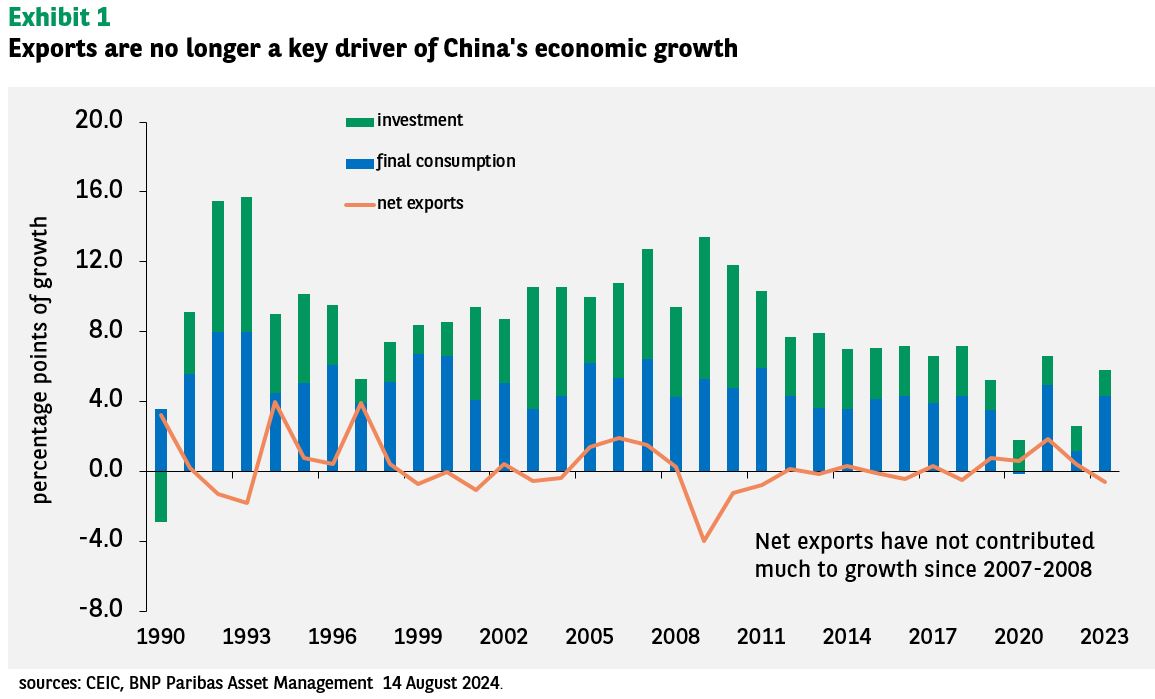Understanding The Breakdown In U.S.-China Relations: Implications For A New Cold War

Table of Contents
Historical Context: Seeds of Discord in U.S.-China Relations
The current tensions in U.S.-China relations didn't emerge overnight. A complex history, marked by periods of both cooperation and conflict, has laid the groundwork for the current strained relationship. Understanding this historical context is vital to grasping the depth of the current challenges.
- Early diplomatic exchanges and the establishment of relations: The normalization of relations in 1979 marked a significant turning point, opening doors for trade and cultural exchange. However, underlying differences in political ideologies and strategic interests persisted.
- Trade disputes and economic tensions: Even during periods of cooperation, trade imbalances and disputes over intellectual property rights created friction. These issues became increasingly prominent as China's economy grew rapidly.
- Taiwan's status as a persistent point of contention: China's claim over Taiwan remains a major source of tension, with the U.S. maintaining a policy of "strategic ambiguity" regarding its defense. This ambiguity fuels uncertainty and the potential for military escalation.
- Human rights concerns and differing political ideologies: Disagreements over human rights, particularly concerning issues in Xinjiang and Hong Kong, have deepened the chasm between the two nations. Differing political systems – democracy versus authoritarianism – further exacerbate these differences.
- South China Sea disputes and regional power dynamics: China's assertive actions in the South China Sea, including island building and military deployments, have increased tensions with neighboring countries and the U.S., contributing to regional instability and a heightened military presence.
Economic Competition and Trade Wars: A Major Source of Friction
The escalating trade war between the U.S. and China represents a significant turning point in their relationship. Tariffs, trade imbalances, and accusations of intellectual property theft have fueled this conflict, impacting global markets and supply chains.
- Impact of tariffs on businesses and consumers in both countries: The imposition of tariffs has led to increased prices for consumers and disrupted supply chains for businesses in both the U.S. and China.
- The role of technology in the trade war (e.g., 5G, semiconductors): Competition in crucial technological sectors like 5G and semiconductors has intensified the trade war, with both countries seeking to gain technological dominance.
- China's economic rise and its challenge to U.S. global dominance: China's rapid economic growth has challenged the U.S.'s long-held position of global economic leadership, adding another layer of complexity to the economic competition.
- The impact on global supply chains: The trade war has disrupted global supply chains, highlighting the interconnectedness of the global economy and the vulnerability of businesses reliant on international trade.
Ideological Differences and Geopolitical Rivalry: Beyond Economics
Beyond economic competition, fundamental ideological differences and geopolitical rivalry fuel the breakdown in U.S.-China relations. The contrasting political systems and differing views on international norms create a deep divide.
- The competition for global influence and strategic partnerships: Both countries are vying for global influence, competing for strategic partnerships and alliances worldwide. This competition extends to various regions and international organizations.
- Disagreements on human rights, democracy, and international norms: Deep disagreements on human rights, democracy, and the rule of law create fundamental obstacles to cooperation.
- The role of propaganda and disinformation campaigns: Both countries engage in propaganda and disinformation campaigns, further exacerbating tensions and undermining trust.
- The influence of each nation on international organizations: Both the U.S. and China exert significant influence on various international organizations, often leading to clashes over policies and decision-making processes.
The Military Dimension: An Escalating Arms Race?
The military dimension of U.S.-China relations is arguably the most alarming aspect of the current deterioration. Increased military spending, modernization efforts, and regional tensions create a volatile situation.
- China's military modernization and its implications for regional security: China's rapid military modernization, including its naval expansion and development of advanced weaponry, poses a significant challenge to regional security.
- U.S. military presence in the Indo-Pacific region: The U.S. maintains a significant military presence in the Indo-Pacific region, contributing to the strategic competition and raising the risk of miscalculation.
- The potential for accidental escalation and miscalculation: The increased military activity and heightened tensions in the South China Sea and Taiwan Strait raise the risk of accidental escalation and miscalculation.
- Cyber warfare and information operations: Cyber warfare and information operations are increasingly used as tools of competition, adding another layer of complexity to the military dimension.
Implications for a New Cold War: Global Consequences
The deterioration of U.S.-China relations carries significant global consequences, potentially leading to a new Cold War scenario with far-reaching implications.
- The impact on global trade and economic growth: A new Cold War could severely disrupt global trade and significantly slow down economic growth, potentially leading to global recession.
- The realignment of global alliances: Nations will be forced to choose sides, leading to a realignment of global alliances and potentially increasing regional conflicts.
- Increased military spending and the potential for arms races: A new Cold War would likely lead to a substantial increase in military spending by both sides, potentially triggering an escalating arms race.
- The potential for proxy conflicts and regional instability: Proxy conflicts and regional instability are more likely in a scenario where both superpowers compete for influence.
- The impact on climate change cooperation: The worsening relationship between the U.S. and China could significantly hamper international cooperation on climate change, undermining efforts to mitigate its effects.
Conclusion
The breakdown in U.S.-China relations is driven by a complex interplay of historical grievances, economic competition, ideological differences, and geopolitical rivalry. The potential for a new Cold War scenario is real, carrying severe implications for global stability, economic prosperity, and international cooperation. Understanding the nuances of the breakdown in U.S.-China relations is not just crucial for policymakers, but for all global citizens. Stay informed about developments in U.S.-China relations and advocate for policies that prioritize diplomacy and cooperation to prevent a new Cold War. Active engagement and informed discussion are vital to mitigating the risks and fostering a more peaceful and cooperative future in U.S.-China relations.

Featured Posts
-
 Coordinating Repatriation South Sudan And The Us Governments Joint Plan For Deportees
Apr 22, 2025
Coordinating Repatriation South Sudan And The Us Governments Joint Plan For Deportees
Apr 22, 2025 -
 A Farewell To Pope Francis A Leader Who Embodied Compassion
Apr 22, 2025
A Farewell To Pope Francis A Leader Who Embodied Compassion
Apr 22, 2025 -
 The Nationwide Anti Trump Movement A Look At The Protests
Apr 22, 2025
The Nationwide Anti Trump Movement A Look At The Protests
Apr 22, 2025 -
 The Impact Of Tariffs On Chinas Export Led Growth Model
Apr 22, 2025
The Impact Of Tariffs On Chinas Export Led Growth Model
Apr 22, 2025 -
 Analyzing The China Market Challenges And Opportunities For Luxury Car Brands Like Bmw And Porsche
Apr 22, 2025
Analyzing The China Market Challenges And Opportunities For Luxury Car Brands Like Bmw And Porsche
Apr 22, 2025
